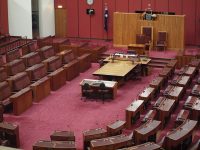Should Lying in Parliament be a Crime?

The perception that politicians are often untrustworthy is widespread in Australian society, but what would happen if it were actually illegal for politicians to lie in parliament?
In the UK, a petition has been launched to make lying in parliament a crime, with the aim of encouraging political debate and discussion around the idea of politics and truth. The petition currently has over 100,000 signatures, indicating the general lack of trust in the integrity of MPs amongst the public.
In the UK parliamentary system, as in the Australian federal system, there are currently no laws stating that lying in parliament is a criminal offence and no legal consequences for politicians who are found to have strayed from the truth in their statements.
What is the problem with lying politicians?
As well as setting up expectations in the community and misleading voters, MPs who make inaccurate and misleading statements in parliament can create a bigger problem. The statements made in parliament are often reported in the media and if they are incorrect this can lead to a widespread misconception among the community which can then impact future elections and lead to misunderstandings about certain issues on a more widespread level.
One example where this has happened in Australia is during discussions around the National Broadband Network (NBN). A number of senior coalition politicians, while in opposition, were criticised for making inaccurate statements about the NBN in a bid to discredit the vision suggested by the then Labor government and promote their own agenda. Some of these statements included claims that Telstra was planning to release a 12Mbps broadband service which would surpass the NBN, falsely stating that the NBN wasn’t going to be rolled out in certain electorates, and claiming that customers were going to have to pay three times the amount for the NBN than they currently paid for broadband.
Although these claims were completely inaccurate, the MPs involved continued to repeat the statements as fact, even after their inaccuracies were pointed out by media outlets and industry experts.
What does the law say about lying in parliament in Australia?
There is no law covering the behaviour of federal politicians in Australia. In Queensland, legislation has been enacted that makes it an offence for state politicians to lie in parliament, while in other states lying in parliament is treated as a misdemeanour rather than as a criminal offence. Although politicians can be at risk of losing votes or even their jobs if it is revealed that they have knowingly made inaccurate statements, currently, they don’t have to face criminal sanctions, except in Queensland.
The laws in Queensland were resurrected in 2012, after having previously been repealed by the then Labor government in 2006. Under these laws it is a criminal offence to lie to Queensland’s parliament or one of its committees, as well as to create a disturbance while parliament is sitting or to refuse to give evidence to a parliamentary committee. The laws apply to the public as well as politicians and the penalty includes up to seven years in prison. The laws were reinstituted as a way to help improve the Queensland parliament’s reputation.
Would new laws make a difference?
It’s important to be aware that introducing laws to make it an offence to lie in parliament won’t completely stop politicians from making false or inaccurate statements. Many of the statements that are made by MPs are made outside parliament, in press releases or in statements to the media.
Changes to the law could potentially improve the quality of the debate within parliament and help reduce the likelihood of inaccurate statements being reported in the media and taken as fact, as well as providing greater legal accountability and consequences for politicians who repeatedly and knowingly make false statements to further their own ends.
Although it seems unlikely that laws will be introduced on a federal level as they have been in Queensland, the public has certain expectations of their MPs, including honesty and integrity. Introducing penalties for lying in parliament could help improve the reputation of our politicians but it is debatable whether they would make a significant difference overall.
Receive all of our articles weekly
Author






